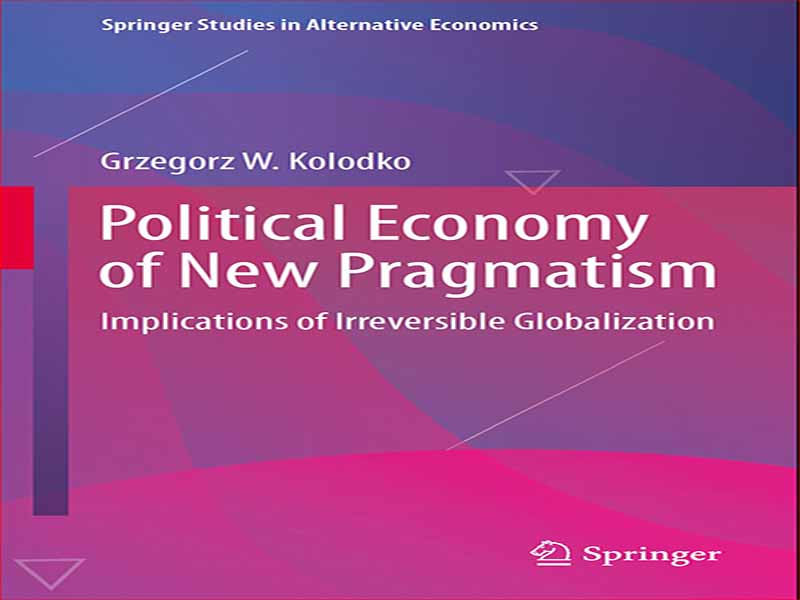- عنوان کتاب: Political Economy of New Pragmatism
- نویسنده: Grzegorz W. Kolodko
- حوزه: اقتصاد سیاسی
- سال انتشار: 2022
- تعداد صفحه: 279
- زبان اصلی: انگلیسی
- نوع فایل: pdf
- حجم فایل: 25.1 مگابایت
هزاره پیش – در سال 1021 – شجاع ترین وایکینگ ها از شمال اروپا، پس از یک لشکرکشی جسورانه و طاقت فرسا، که طی آن بسیاری از آنها – هنوز تعدادشان مشخص نیست – مردند، سرزمین جدیدی پیدا کردند که هنوز هم به همین شکل نامیده می شود. نیوفاندلند ما نمی دانیم که آن ملوانان شجاع چه نامی بر آن گذاشته اند. مکانی که آنها به آنجا رسیدند، اکنون L’Anse aux Meadows نامیده می شود، که به یاد استعمار فرانسوی بعدی است. وایکینگ ها به جزیره ای در سواحل شمال شرقی یک قلمرو وسیع رسیدند، قاره ای دوتایی که باید نیم هزاره دیگر منتظر می ماند تا نامش آمریکا باشد، که به نوبه خود نامی است که ما مدیون مسافر ایتالیایی، آمریگو وسپوچی هستیم. او از اشتباهی که کلمب مرتکب شد اجتناب کرد، زیرا میدانست که به یک قاره جدید بزرگ، دنیای جدید آمده است. سپس، در سپتامبر 1519، یک ناوگروه کوچک متشکل از پنج گالن به فرماندهی فردیناند ماژلان از جنوب غربی اروپا، در سواحل اسپانیا حرکت کرد و به سفری به دور دنیا رفت، کروی بودن آن که بسیاری از مردم هنوز به آن اعتقاد نداشتند. آن ملوانان شجاع، مانند وایکینگها، به سمت غرب حرکت کردند، اما مسیر جنوبی را برای انجام کاری که به ظاهر غیرممکن به نظر میرسید، طی کردند – دور زدن کره زمین. اندکی بعد، خورشید دیگر بر روی امپراتوری پادشاهان اسپانیا، چارلز پنجم و فیلیپ دوم غروب نمی کرد. امپراتوری های دیگری نیز در حال ظهور و تکامل بودند که خورشید برای مدتی بر آنها می تابد. عصر جهانی شدن فرا رسیده است، اگرچه هیچ کس از این اصطلاح برای توصیف این فرآیند استفاده نکرد. یک فرآیند، زیرا دقیقاً یک سیر وقایع است که جوهر آن را فقط در گذر زمان می توان درک کرد.
A millennium ago—in 1021—the bravest Vikings from the north of Europe, after a daring and grueling expedition, during which many of them—yet, their numbers are unknown—died, found a new land that is still called that way today—Newfoundland. We do not know the exact name given to it by those courageous sailors. The place they arrived at is now called L’Anse aux Meadows, in memory of later French colonialism. The Vikings reached an island off the north-east coast of a vast territory, a double continent that had to wait another half a millennium to be named America, which in turn is the name we owe to the Italian traveler, Amerigo Vespucci. He avoided the mistake made by Columbus, as he knew that he came to a vast new continent, the New World. Then, in September 1519, a small flotilla of five galleons under the command of Ferdinand Magellan sailed from southwestern Europe, off the coast of Spain, and set off on a journey around the world, the sphericity of which many people still did not believe in. Those valiant sailors, like the Vikings, headed west but took a southerly course to do the seemingly impossible—to circumnavigate the globe. Shortly after, the Sun was no longer setting over the empire of the Kings of Spain, Charles V, and Philip II. There were also other empires emerging and evolving, with the Sun shining over them for some time. The age of globalization has arrived, although nobody used that term to describe this process. A process, because it is exactly a course of events whose essence can only be grasped in terms of the passage of time.
این کتاب را میتوانید از لینک زیر بصورت رایگان دانلود کنید:
Download: Political Economy of New Pragmatism




































نظرات کاربران